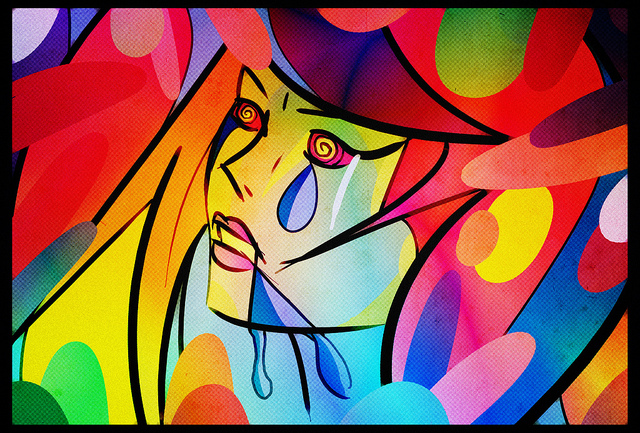
I have an enlarged empathy gene.
It swells at inopportune moments. It throbs and causes great pain.
My husband suggests removal, but I so far, I can’t let it go.
Lately, we’ve been watching the new ABC drama The Family. A popular teen actor from the ‘80s plays an accused child molester imprisoned for the murder of his neighbor’s child. The political aspirations of the missing boy’s mother make her difficult to like, but it’s easy to feel for her regarding the loss of her son.
The problem?
I feel just as deeply for the creepy, lurking neighbor as I do for the broken-hearted mom.
This empathy gene also kicks in during family squabbles. I often find myself defending the abrasive actions of someone the rest of the clan has banded together to condemn.
But what about adults who get in their own way, who cause their own problems? It’s a double tragedy. My symptoms only get worse. Self-defeating actions of friends, neighbors or relatives act like an enzyme thrusting the gene into overdrive.
Professional athletes can trigger a reaction. A dropped pass in the end zone often leads to: “Just imagine, somewhere his poor mother is watching and feeling awful for her son.”
My family’s response: “Good! She should feel awful. She raised an awful football player.”
Benefits of my condition? I’m sure there are a few.
Generally, I have long-lasting, deep relationships with most people in my life.
The longer the relationship continues the more this becomes a double-edged sword though. The better we know each other, the more feelings there are to share and experience. The good, the bad, the ugly.
I’d love to feel just a little less. Scrape off a layer or two of emotional awareness. Deaden a few empathy nerve endings, care less about some things—like the feelings of rich athletes I’ll never meet.
My husband would pay for this elective surgery. It would mean less tears at McDonald’s commercials, and don’t even get him started on the upcoming Olympics. The montages set to music? Eeeek—paralysis for days.
The condition strains my marriage sometimes. I often cajole my husband into maintaining relationships he would have dissolved long ago.
Even my adult children accuse me of making excuses for the poor behavior of insensitive relatives or thoughtless neighbors. They may have a point, but I swear it’s involuntary.
I’m not a saint. Just because I share or understand the feelings and emotions, doesn’t mean I’m always prompted to act or carry out good deeds.
Like every one of us besides Mother Teresa, sometimes I’m thoughtful and caring, sometimes self-involved and too busy or lazy to reach out.
Still, I suffer the pain of the emotions and feelings.
By no means am I a door mat either. I’m vocal, protective of my closest friends and family, and have always stood up for myself. If someone has a pattern of hurtful behavior toward me, I set my own boundaries and stick to them.
But I can’t seem to write anyone off permanently, and I can’t stop the awareness of how they feel from seeping into my bloodstream.
The definition of empathy is the ability to understand and share the feelings of another.
This doesn’t indicate only negative feelings, but those cause the most damage. The happy joyful moments don’t have the same sting to them, and the euphoria doesn’t pierce as deep as the sorrow.
Within ten minutes of walking into a BBQ, Christmas party or baby shower, I can tell who argued on the drive over, who has a crush on someone else’s husband and who is having a rough day, week or month.
I don’t observe body language or tone of voice in hopes of sifting these emotions out. They wash over me, unbidden.
It’s like a superpower—or a curse.
I know I’m not alone. There must be other sufferers. I suspect mostly women.
I’d love to be more like my husband; to either not suffer the onslaught or to notice and care less.
My husband’s empathy gene isn’t undersized or underactive. He visited the site of the Oklahoma Bombing memorial years ago and still tears up when describing the exhibits. He feels for children and small animals. His gene seems to stop at adults that are responsible for their own actions. I wish mine did, too.
Research on the cause of the gene mutation is sketchy. My husband is of the opinion that thinking too much can trigger the gene.
I’ve never quite bought into this theory for two reasons: 1. How do you quantify too much thinking? 2. The feelings come first, then the thoughts.
The first step to a cure is usually understanding the cause. Until there is an effective treatment (besides alcohol to deaden the senses), I will most likely continue to suffer.
But I’ve found some ways to cope:
I don’t watched televised news. I limit my time scrolling through other people’s social media posts and unfollow those that have a negative bent.
I continue to avoid movies and books with certain subject matter that cause my condition to flare up. I avoid scenes of torture, anything regarding the Holocaust and gratuitous violence when looking for entertainment.
One of the best remedies has been to move from thought to action. When a neighbor has a health crisis, I try to do one helpful thing instead of just worrying about how they’ll manage.
Before bed each night, I fill out a tiny slip of paper with at least one thing I’m grateful for that day. I end my day with gratitude and reading for pleasure instead of flicking through a screen.
And I’m meditating again. I’m not very good at clearing out my mind, but then I learned I don’t have to be perfect. I’ve also found some great tips on elephant journal to help me with the practice.
Logically I know I can’t make all my siblings get along, make my husband maintain friendships he’s outgrown or console professional athletes after a bad game. Emotionally, I’m still learning.
But the empathy gene allows me to offer understanding and acceptance to those I love. I will continue to manage my symptoms, but this is one condition I don’t want to completely cure.
Author: Suzanne M. Brazil
Editor: Nicole Cameron
Image: Surian Soosay/Flickr


Read 1 comment and reply